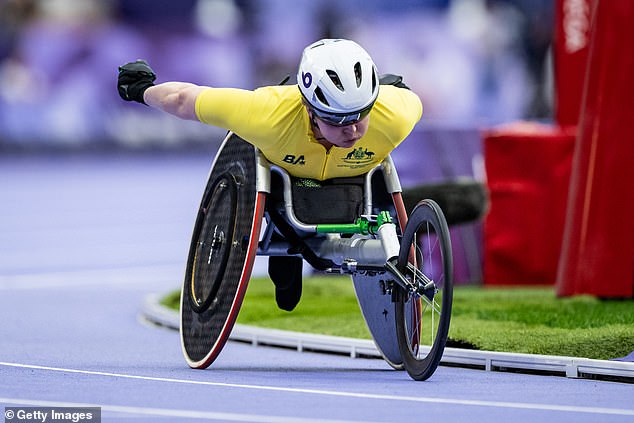Paralympics organisers failed athletes in Paris. Now Aussie captain says a big change needs to happen before Brisbane 2032
- Wheelchair athlete to compete in 7th Paralympic Games
- Has revealed frustrating conditions for athletes
- Wants athletes to have more say ahead of Brisbane Games
Australian wheelchair racer Angie Ballard has warned race organisers ahead of the 2032 Paralympic Games in Brisbane.
The Australian veteran will lead the Paralympic team in Paris after making her debut at the 2000 Paralympic Games in Sydney and becoming world champion at the 2004 Olympic Games in Athens.
Ballard, who has collected eight medals in seven Games, finished sixth in her T53 400m race.
Ballard became frustrated with the Paris 2024 organization for not taking into account the needs of para-athletes.
“You don’t have to add anything afterwards. You don’t have to make exceptions,” she said in an impassioned interview at the Stade de France.
‘I don’t have to turn right here 57 times, that’s not good for me.
‘I no longer have to drive over bad surfaces with my expensive tires that can burst at any moment.
‘If you take all these things into account from the start, then everyone is welcome, everyone is involved and everyone can perform optimally. And that is what it should be.
“We are here to perform, not to show how we can survive that challenge.”
Australian wheelchair racer Angie Ballard is competing in her seventh Paralympic Games and has described the frustrations of athletes

Ballard wants athletes to have more say in the organization of future Paralympic Games
The Australian team co-captain said ahead of the 400m race on Thursday that wheelchair athletes had just three lanes available to warm up.
“I just want to point out that around the international Paralympic Games and athletics at home, a lot of decisions are made by people who don’t really take into account the performance of what we do,” she said.
‘I think you need more people who have experience having these conversations themselves, former athletes and former coaches.
‘Everyone with experience is the best, but you can’t just get one answer to the question about a disability or sport.’
Wheelchair athletes during the Games also noted that the stadium design in several locations, particularly the narrow corridors of the Stade de France, is difficult to navigate.
Ballard insisted her frustrations were not a result of her own T53 classification.
“I would like to see a day where all the different classes are supported so they can perform at their best,” she said.
“Which means different things for different classes. Some of our quadriplegic athletes can’t sweat, so if you put them on in the heat during the day, performance is compromised.
“The same goes for athletes in their 30s who have to go for a long walk and have coordination problems. That affects their performance.”
